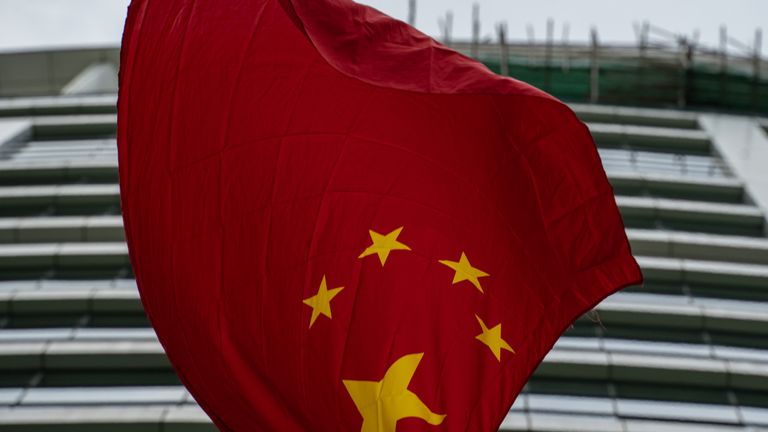How will UK's suspension of its Hong Kong extradition treaty affect relations with China?
Hopes by some for sweeping reprisals over Hong Kong security laws and human rights abuses against Uighurs were not realised.
Monday 20 July 2020 18:07, UK
The UK government has confirmed it will halt its extradition treaty with Hong Kong, after China imposed tough new national security laws.
Three Sky News correspondents have given their take on what today's statement from Foreign Secretary Dominic Raab means for UK-China relations...
Tom Cheshire, Asia correspondent
The UK has been pressuring China on an unprecedented number of fronts - Huawei, the oppression of the Uighur ethnic minority in Xinjiang, and the national security law in Hong Kong.
Each intervention provokes a response from Beijing, which most recently promised "resolute reactions".
China has not shied away from those reactions with other countries - putting tariffs on Australian barley, imprisoning Canadian citizens, sanctioning US politicians. But so far there's been little actual retaliation towards Britain.
Suspending an extradition treaty with Hong Kong is unlikely to prompt one either: Beijing would probably have thought this a likely consequence of the national security law, and imposed the law anyway.
Huawei is still the bigger irritant - and we're waiting on the consequences of that. State media have floated the possibility of boycotting British brands and universities.
Jon Craig, chief political correspondent
Anyone hoping for sweeping reprisals from Dominic Raab against China over Hong Kong security laws and human rights abuses against the Uighur Muslims will have been disappointed.
He won plaudits from MPs by extending the arms embargo on China to Hong Kong, banning UK exports of lethal weapons and equipment used to suppress dissent, and the widely-predicted suspension of the extradition treaty.
The embargo would mean a ban on the export of equipment which might be used for internal repression such as shackles, intercept equipment, firearms and smoke grenades, the foreign secretary told MPs.
But what was missing from the foreign secretary's statement was sanctions on Chinese officials for the persecution of the Uighur Muslims, no doubt because this would have been seen by the Chinese as a much more provocative act.
His excuse, in his reply to the impressive Lisa Nandy, the shadow foreign secretary, was that it takes months to gather the evidence of such human rights abuses and can't be done on a political whim.
Mr Raab concluded his statement by claiming his actions were "reasonable and proportionate".
But perhaps what was more revealing was when he told MPs: "We want to work with China." And then: "We want a positive relationship with China."
At the weekend, China's UK ambassador said in a TV interview that the British government was "dancing to the tune of the United States". Mr Raab was clearly trying desperately not to appear to be doing that.
We knew what was coming from the foreign secretary when Boris Johnson promised a tough, balanced and "calibrated" approach to China.
When it came, it was certainly agreed it was balanced and measures, but it could have been tougher.
Deborah Haynes, foreign affairs editor
Reasonable and proportionate - those are the words used by the foreign secretary to describe the UK's punishment of China over its actions in Hong Kong.
Beijing will not agree.
Liu Xiaoming, the Chinese ambassador to London, has already warned that there will be consequences - they just have not yet been spelled out.
This is a pivotal time for the world's rising superpower, seeking to demonstrate its authority as global alliances come under strain and relationships change.
But the UK will take comfort in the knowledge that it is not acting alone.
:: Listen to Sophy Ridge on Sunday on , , ,
Its decision to suspend an extradition treaty with Hong Kong follows similar action by Canada and Australia. The United States has also altered its relationship with Hong Kong.
The UK move to extend an arms embargo already imposed on mainland China to Hong Kong is designed to underline London's frustration with Beijing for pushing ahead with what is seen as a draconian national security law imposed on the former British territory.







